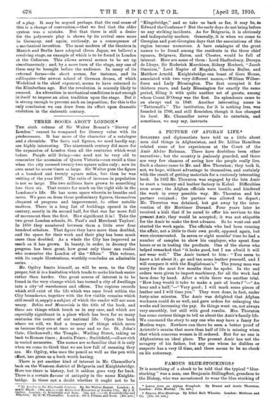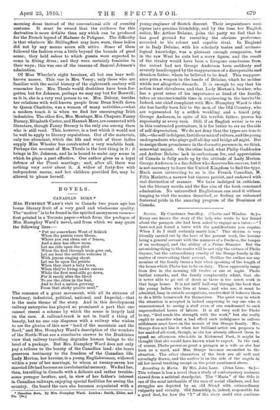FAMOUS BLUE-STOCKINGS:f
IT is something of a shock to be told that the typical "blue- stocking " was a man; one Benjamin Stillingfleet; grandson to the Bishop, who was accustomed to wear the blue stocking of • Leaves from an Afghan Scrapbook. By Ernest and Annie Thornton. London: John Murray. (Be. net.]
t Famous Blue-Stockings. By Ethel Bolt. Wheeler. London: Methuen and Co. [10s. 63. net.]
morning dress instead of the conventional silk of evening costume. It must be owned that the evidence for this derivation is more definite than any which can be produced for the French legend of Madame de Polignan. The difficulty is that whatever Mr. Stillingfleet may have worn, these ladies did not by any means scorn silk attire. Some of them followed the fashion even a little beyond the bounds of good sense; they held salons to which guests were expected to come in fitting dress; and they were certainly feminine in their ways ; this was one of the reasons of Samuel Johnson's admiration.
Of Miss Wheeler's eight heroines, all but one bear well- known names. This one is Mrs. Vesey; only those who are familiar with the social history of the eighteenth century will remember her. Mrs. Thrale would doubtless have been for- gotten but for Johnson, perhaps we may say but for Boswell; as it is, she is a very real person to us.. Mrs. Delany, besides her relations with well-known people from Dean Swift down to Queen Charlotte, was a woman of many activities,—what a modern touch it is when we find her encouraging Irish industries. The other five, Mrs. Montagu, Mrs. Chapone, Fanny Burney, Elizabeth Carter, and Hannah More, are connected with literature, though Fanny Barney is the only one among them who is still read. This, however, is a test which it would not be well to apply to literary reputations. Ont of the materials, only too abundant, which the life and work of these ladies supply Miss Wheeler has constructed a very readable book. Perhaps the account of Mrs. Thrale is the best thing in it: it brings in Dr. Johnson, and he is bound to make any scene in which he plays a part effective. Our author gives us a loyal defence of the Piozzi marriage; and, after all, there was nothing very outré about it. A widow of forty-five with independent means, and her children provided for, may be allowed to please herself.















































 Previous page
Previous page